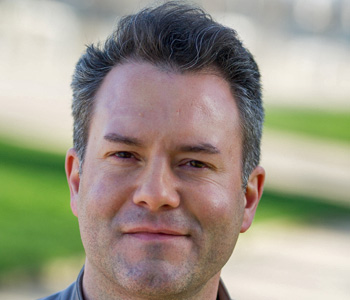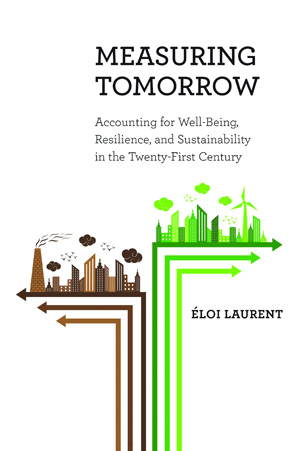
Measuring Tomorrow is about ending our passion for growth and engaging in the well-being and sustainability transition. Growth of Gross Domestic Product, or GDP, captures only a tiny fraction of what goes on in complex human societies: it tracks some but not all of economic well-being (saying nothing about fundamental issues such as income inequality); it does not account for most dimensions of well-being (think about the importance of health, education or happiness for your own quality of life); and it does not account at all for sustainability, which basically means well-being not just today but also tomorrow (imagine your quality of life on a planet where the temperature would be four degrees higher or where there would be scant drinkable water or breathable air). This book’s essential argument is that well-being (human flourishing), resilience (resisting to shocks) and sustainability (caring about the future) should become the collective horizons of social cooperation instead of growth. And it offers powerful tools, dozens of examples from all corners of our world, and practical ways to achieve this goal.
To put it differently, while policymakers govern with numbers and data, they are as well governed by them, so they better be relevant and accurate. It turns out, and I think that’s a strong argument of the book, that GDP’s relevance is fast declining in the beginning of the twenty-first century for three major reasons. First, economic growth, so buoyant during the three decades following the Second World War, has gradually faded away in advanced and even developing economies and is therefore becoming an ever-more-elusive goal for policy. Second, both objective and subjective well-being—those things that make life worth living—are visibly more and more disconnected from economic growth. Finally, GDP and growth tell us nothing about the compatibility of our current well-being with the long-term viability of ecosystems, even though it is clearly the major challenge we and our children must face.
Since “growth” cannot help us understand, let alone solve, the two major crises of our time, the inequality crisis and ecological crises, we must rely on other compasses to find our way in this new century. In my view, the whole of economic activity, which is a subset of social cooperation, should be reoriented toward the well- being of citizens and the resilience and sustainability of societies. For that to happen, we need to put these three collective horizons at the center of our empirical world.
Measuring Tomorrow is essentially a guide to the well-being and sustainability transition and as such aims to make four contributions. First, while we have several insightful historical accounts of GDP’s ascent, we also need to take stock of existing alternatives in a forward-looking way. By the same token, we have plenty of pointed critiques of GDP but need to address the limitations of the alternative indicators to growth. Dozens of the latter are created or updated each year, such as the Social Progress Index (SPI) or the Environmental Performance Index (EPI) but their conceptual and empirical foundations are often obscure or sometimes weak. (What exactly do they measure? How well do they measure it?) This book is not only a (necessarily partial) guide to alternative indicators, but a guide to understanding their meaning, accuracy, and usefulness.
Measuring Tomorrow also attempts to grasp these alternative indicators’ plurality in an as-yet missing consistent framework so that we can better understand the continuum among well-being, resilience, and sustainability. Because this framework breaks down well-being and sustainability into a limited number of fundamental dimensions, it does not impose one best indicator on readers, but rather invites them to select and even design those that matter the most for them. This book also intends to convince readers, within this framework, that advances in human well-being are fully compatible with environmental sustainability and even that the two are, or at least can be, mutually reinforcing. In doing so, it counters the beliefs that there is an unsurmountable trade-off between well-being and sustainability, that sustainability can exist without well-being, and that well-being does not need to be sustainable. Well-being represents the many dimensions of human development (or, in a more poetic view, human flourishing). Resilience represents well-being under shocks. Sustainability represents dynamic well-being. Linking these three dimensions is an operational way to acknowledge the continuity or non-dichotomy between humans and their natural environment, or, in the words of French social psychologist and environmental pioneer Serge Moscovici, the fact that “almost all of the natural world is now human while humans have always been natural.”
Finally, I try to show throughout the book how metrics can change policy. Well-being and sustainability indicators now need to become performative and not just descriptive. While we should be concerned about obsessive quantification, blind monetization, and hazardous commodification, building, disseminating, and using alternative indicators is a practical way to reclaim essential values and advance important issues. Done properly, measuring produces positive social meaning. But we should not shy away from the ethical questions posed by valuation: Can we measure everything? Should we?
I was trained as a macroeconomist and realized ten years ago that economics, the small human household, was contained in and fully depended on the larger household of the biosphere, so that measuring economic realities in a narrow and isolated way made little sense. This book is a testimony to how much my vision of economics has changed in the last decade, especially through teaching.
I think the chapter on health is the perfect introduction for any reader interested in what goes on in our contemporary societies and wondering how this book would change her/his vision.
The most striking fact about the fate of humanity in the twentieth century concerns health, not growth: we have seen a greater improvement in human health in the second half of the twentieth century than at any moment in all human history, i.e., the last seven million years. Life expectancy skyrocketed between 1900 and 2000; a century described (and rightly so) as eminently violent and destructive. According to historical data gathered by the late Angus Maddison, during the twentieth century, life expectancy increased, on average, five times more than in the millennium that preceded it.
Moreover, simple metrics such as life expectancy or mortality rates tell us a whole different story about what has happened in a given country in the last thirty years than just growth. Take the US. The recent discovery by economists Angus Deaton and Anne Case of very high mortality rates among middle-aged whites in the United States, all the while GDP was growing, is proof that health status must be studied and measured regardless of a nation’s perceived wealth status. How is it that the richest country in the world in terms of average income per capita, a country that devotes more of its wealth to health than any other, comes close to last in the rankings with comparable countries in terms of health outcomes? Use different indicators, as I do in the chapter devoted to health, and the solution to the American health puzzle quickly becomes apparent: the ballooning of inefficient private spending has led to a system where the costs are huge compared to its performance. The healthcare reform initiated by Barack Obama in 2009 can actually be explained by the desire to amend a health system in which the human and economic cost has become unbearable. If this reform was to be destroyed, the cost would no doubt skyrocket again.
I hope this book becomes an accelerator of the well-being and sustainability transition already under way. This transition received international recognition in September 2015, when the United Nations embraced a “sustainable development goals” agenda in which GDP growth plays only a marginal role. In the US, scores of scholars and (some) policy makers increasingly realize the importance of paying attention to inequality rather than just growth. China’s leaders acknowledge that sustainability is a much better policy target than explosive economic expansion. Pope Francis is also a force of change when he writes in the encyclical Laudato si, published in June 2015, “[w]e are faced not with two separate crises, one environmental and the other social, but rather with one complex crisis which is both social and environmental,” and urges us to abandon growth as a collective horizon. Influential newspapers and magazines such as The Economist and The New York Times recently ran articles arguing that GDP should be dropped or at least complemented. Local transitions are happening all over the planet, from Copenhagen to Baltimore, Chinese provinces to Indian states. But we need to change our behaviors and attitudes faster, because the great race of the 21st century between human intelligence and human greed is currently being lost. Measuring well-being, resilience, and sustainability has the power to change the way we see the world, what we do in it, and what we do to it.


Éloi Laurent is a Senior Economist at OFCE (Sciences Po Centre for Economic Research, Paris) and Professor in the School of Management and Innovation in Sciences Po. A macroeconomist by training, his current work focuses on environmental sustainability, well-being, and social ecology. He is the author or editor of twelve books (five translated into several languages), four governmental reports, and a hundred articles published in French and international journals. He has a background in policy making as a former parliamentary assistant in the National Assembly (Paris) and aide to the French Prime Minister and an extensive international academic experience, most recently as a Visiting Professor at the University of Montreal and Visiting Scholar and Visiting Professor at Harvard University. He currently teaches new indicators of well-being, resilience, and sustainability and ecological economics at Stanford University and Sciences Po.